Interview with Janet Rodriguez
Janet Rodriguez. I first met her at a Buddy Lunch at my second Antioch MFA residency. Returning students are paired with first semester students—buddies—to help show them the ropes. My own buddy was unable to make the luncheon, so I joined Janet and her assigned buddy Jerry. Our friendship was born!
Janet is an amazing woman over 50! She has faced several major traumas in her childhood and young adulthood and has made it to the other side of those traumas. She’s a strong woman, who is still—as we all are—traveling on her path to healing. I first wanted to interview Janet because I wanted to learn more about the important place religion holds in her life. (She worked as a missionary in Africa for seven years!)
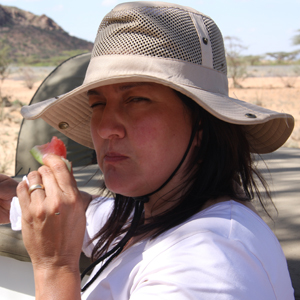
Yet, when we began speaking, Janet shared her experience in Africa—and so much more. She was incredibly open and honest with some very difficult topics, including religion, childhood sexual abuse, abortion, and drug addiction.(Janet just celebrated her sixth year of living flour, sugar, and alcohol-free!) If these topics are triggering for you, please read with care.
Janet and I spoke on the phone in March for this interview. Please join me in learning about this brave and resilient woman!
Diane: I read your beautiful piece on your blog about your mom (https://www.brazenprincess.com/2019/03/jennie.html). How old’s your mom?
Janet: She just turned 83.
Diane: Oh, so she’s a youngster!
Janet: I know. She’s a beautiful person. I just went to go see her. We had a whole family gathering on St. Patrick’s Day. My father’s Irish and my mother’s Mexican, so my father does this huge thing for St. Patrick’s Day. And because my mom’s birthday is March 8th, they decided to combine the two—have a St. Patrick’s Day birthday party for my mom.
Diane: Nice. I loved your piece recently published in Lunch Ticket (https://lunchticket.org/the-language-of-community/). I wanted to go deeper.
Janet: Okay.
“I don’t think that any one church has a corner on the market for truth. The capital “T” truth.”
Diane: First of all, let’s talk about religion in your life. Lots of people have religion in their lives, but very few people go to Africa for seven years on a mission trip, right?
Janet: Right.
Diane: So, was religion always so important to you? Was it to your husband? Please tell me how the idea started, how you decided to leave your family and go.
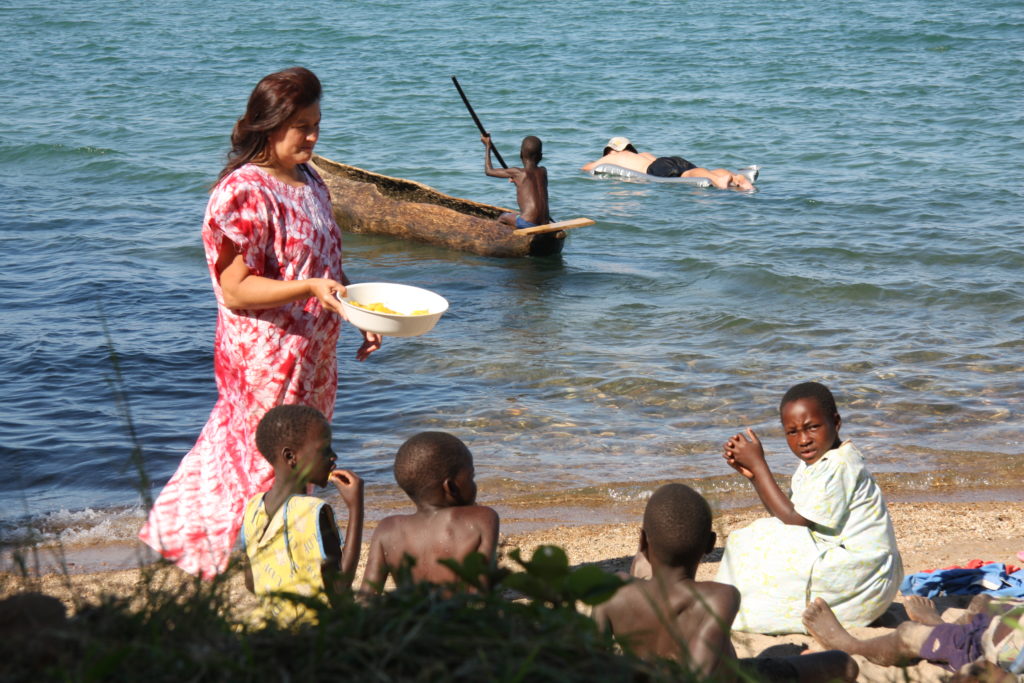
Janet: Excellent. Excellent. Okay.
I am nondenominational. In other words, I don’t claim any denomination or any church having one answer over another. Like, I don’t think that any one church has a corner on the market for truth. The capital “T” truth.
“Religion, that word has always had a difficult presence in my life”
Diane: Right.
Janet: But I do believe … I’m a monotheist. I do believe in one God. I believe in a trinity. So, God the Father, God the Son, and God the Holy Spirit. That’s my belief.
But I also think that religion, that word has always had a difficult presence in my life. So, when someone says religion, I kind of go, “Ugh.” But in truth, there’s something pure in that word because it usually means a discipline of some kind. My parents are Catholic. I had a very good experience with Catholicism. I wasn’t molested by a priest or guilted into anything. But at the same time, there was always this standard of … Goodness.
“I knew, at a very young age, that I was bad”
If you don’t meet that standard, then oh, gosh. You’re a shame. You’re a disgrace. And I knew, at a very young age, that I was bad. At five years old, I “knew.” There were good people, and that there were bad people. Good people had this conscience of, “You know, that’s wrong. To steal is wrong. To say bad words, that’s wrong.”
I had none of that conscience thing. So, I just grew up believing that I’d “fake it till I made it.” I would just try to blend in. And I think eventually, I outgrew that.
I got to a point where I said, “There has to be some real God that finds me acceptable. There has to be.”
At five years old, five or six or seven … I think it was in between five to seven years old, I was molested by an extended family member. He took me aside at family gatherings, took me into my grandparents’ shower closet and molested me at every family gathering.
Diane: Oh, no.
Janet: And it was something that I endured, but I just knew that it happened to me because I was the bad one.
Diane: And you didn’t tell anybody?
Janet: No. Not at the time. No one would have believed me. I was a drama queen. If I said that someone hit me, no one believed me. They wouldn’t have believed that.
When I was thirty-five or so, I told my parents. They were shocked, and they asked me why I never told them. I basically told them what I thought then—that this happened to me because my abuser convinced me I was ready and was a participant.
There is so much manipulation at play when there is childhood sexual abuse. They convince the victim that this is not abuse because _______. Fill in the blank. It’s an age-old trick that is played on children … but in today’s world it’s easier for the child to recognize because we’ve been taught to warn children. And yet, it still happens.
“I remember being in eighth grade religion class, when they were talking about virginity and how it’s a treasure”
Diane: I know that many young girls in your situation feel the same way—that they were at fault. It’s tragic and can have dramatic repercussions.
Janet: Yes. That molestation woke the sexual being up, and I became sexually active very early. I remember being in eighth grade religion class, when they were talking about virginity and how it’s a treasure. And all I could think of was, “Well, I don’t have that anymore, so I may as well just go to town.” In eighth grade, I thought this.
Diane: Wow.
Janet: So, high school was really interesting. I had three boyfriends in high school and was sexually active with all of them. I fell in love with one guy. Then, just shy of my high school graduation, I became pregnant, and all I could think of was, “I’m caught. This is it.”
“And so, I’m in this dilemma. Either I admit to being a bad person and have this child out of wedlock, shaming my family, or …”
Here I am Catholic … I learned that abortion was wrong. My father subscribed to this Catholic magazine, and the first picture I saw of an abortion was in that magazine. It was a very graphic
At the time I got pregnant, my father was in the process of becoming a Catholic deacon. Our family was in the news, and if I had an abortion my pregnancy could remain a secret instead of bringing huge shame to my family. And so, I’m in this dilemma. Either I admit to being a bad person and have this child out of wedlock, shaming my family, or … I had an abortion.
Not long after, I got pregnant again. When I told the father of the child, he said, “Well, I guess we’ll get married.” It was as if he was saying, “I guess we’ll go get Chinese food.”
I was hoping for something else, for him to say, “Yes, you’re worth it. You’re worth marrying. You’re worth accepting as you are.”
“There was something in me that knew the abortion hurt me—it didn’t free me. I believed that I wasn’t worthy of love”
Anyway, when he told his mother that I was pregnant, and we were going to get married, she said, “Please do not do this. This is why my life is such a wreck, because I was pregnant with you when I was in high school, and I had you. I mean, just all of the sudden your life is derailed. You can get married. Just don’t have this child.”
When he came back to me with this, I was kind of numb. I just said, “Okay. Well, I guess I’ll have an abortion.” So, I had another abortion, but because I waited, I had to have a late-term abortion. It was a two-day process—very emotionally and physically painful.
Diane: Was it legal?
Janet: It was legal. This was all in the ’80s, early ’80s. And it was during the time … We call it the Second Wave of Feminism. Gloria Steinem, demanding rights for women. All of my friends and I were feminists, and we were just so filled with power. But at the same time, there was something in me that knew the abortion hurt me—it didn’t free me. I believed that I wasn’t worthy of love.
“These events are huge, a big deal in my religious experience, because they solidified this feeling of being bad”
I was this interesting dichotomy, you know? Went and had a late-term abortion, and soon afterwards, I got pregnant again by that same boyfriend. I didn’t even tell him I was pregnant—I knew what he would say. I just went and had an abortion again. My three abortions happened within 18 months of each other…
Diane: You knew about birth control at the time. Do you think a part of you kept getting pregnant to prove the negative feelings you had about yourself?
Janet: The reason I got pregnant each time was because of birth control failure! The first time I got pregnant I had been taking the birth control pill; the next time, I was using a diaphragm. I was never sure if that thing was fitted right . . . Then, the last time I had been taking birth control pills again. Each time I was trying to protect myself.
I later found out that the Planned Parenthood I was going to had a high rate of pregnancies—we had all been given wrong prescriptions for the pill and wound up pregnant. I think it’s tragic.
Diane: It really is.
Janet: But my abortions became a turning point. These events are huge, a big deal in my religious experience, because they solidified this feeling of being bad. All the stuff that I thought was kind of in my imagination, or, “I guess all kids feel that way,” you know, disappeared. Now I knew I was bad.
So, I kind of shut myself off with drugs and alcohol. Became a really heavy-duty drug user. Really got into methamphetamines. At that time, we called it crank. I started hanging out with bikers, and to them I was a shining example of this virginal kind of woman. But when I got pregnant by my boyfriend, he said, “Well, you have to have an abortion. I’m not ready to be a dad again.” He had a child already.
I said, “I can’t have another abortion.” And until I said those words, I didn’t know that was true. I said, “I’m going to have this child, whether you’re in on it or not.”
And when I said it, it was almost like someone was blowing air into a balloon. I just kept getting bigger and bigger. I felt myself rise up.
I told my parents. They were very upset.
My mom says, “I can’t believe this is happening to you, my feminist. You’re going have to quit school.”
“They wheel me out, and I’m here with this child, and thinking, ‘This is the most incredible feeling, this baby. But I don’t deserve it’”
So, I have this child, and this child is perfect. He is amazing. He comes out, and they lay him on my tummy to cut the umbilical cord. And when they lay him on my tummy, he pushes himself up on his hands and looks in my face. He looked right at me—with these intense, blue eyes, and all I could think of was … and I said it out loud. I said, “Is this normal? Is this normal?” And everyone looks down, and there was this one nurse who said, “Look at that baby. Just look at that baby. Look at him. Look how strong he is.”
They cut the cord, and he goes to sleep right there on my chest. They wheel me out, and I’m here with this child, and thinking, “This is the most incredible feeling, this baby. But I don’t deserve it.”
In fact, there was something in me that couldn’t connect. I didn’t have those feelings anymore. I had shut them off.
“I remember laying my son down in the crib and then getting on my knees and saying, ‘God, if you’re up there, please get me off drugs.’”
I chose to bottle feed him because in my mind, he was clean, and I was dirty. I knew I was going to use drugs as soon as I got home from the hospital. About four days after … Because I had been clean during my pregnancy … four days after I had the baby, I started using again.
My boyfriend and I never had a healthy relationship but adding a baby to the mix made our relationship even more abusive. Eventually, the violence and drug use increased into insanity.
When the baby was six months old, I decided to leave, and moved back in with my parents. I was running from my life, basically, because my boyfriend was abusive and was threatening to shoot me in my sleep.
I remember setting up the baby’s crib in my parents’ house … All I could think of is, “Oh, shoot. I forgot to bring drugs.”
I remember laying my son down in the crib and then getting on my knees and saying, “God, if you’re up there, please get me off drugs.” And it was like, instantaneous. Just an immediate feeling of relief.
That night I ate dinner, which was very rare for me. I mean, for the last couple of months, I wasn’t eating at all, maybe a couple of tablespoons of Cream of Wheat in the morning, and that was it.
So, I was suspicious of this healing, and just saying, “Oh, what if there is a God? And if there is a God, because if that’s what this is, then I bet He’s really mad at me.”
Because that’s the God that I had grown up with. If you do wrong, you have rejection, and if you do right, you have acceptance.
“All I could think of was, ‘There is no way. I’m the girl that people throw away. It just is who I am.’”
Anyway, I got my old job back at a state park. That’s where I met Mario, my husband. He was a supervising ranger at the time. We started hanging out, as friends. We started working on a couple of campaigns together. The police and the feminists usually backed the same political candidate. We were campaigning for Mike Nevin, in San Francisco. I still remember that campaign, because that’s when I realized I was so attracted to Mario.
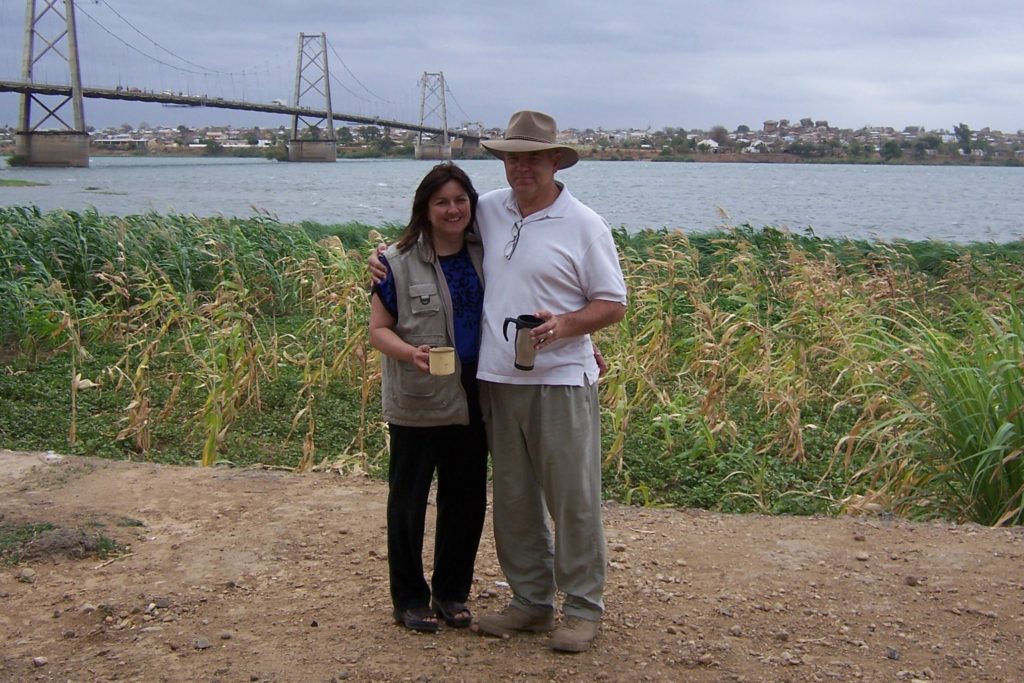
I was in love with him. But he was so out of my league. He was so beautiful and perfect. He had this career, and he had these two children, and an ex-wife that was like an angel. Here I was. I was a recovering drug addict, and I had a baby out of wedlock. I was barely able to keep the wheels on my bicycle. You know?
I remember him saying to me something like, “I’m attracted to you, too.” We had had this conversation, and all I could think of was, “There is no way. I’m the girl that people throw away. It just is who I am.”
Anyway, we got together, and it was wonderful. I had this great boyfriend, who had these great kids, and I had this wonderful baby. But I couldn’t feel my life. I had no feelings. I had stopped taking drugs, and for the most part stopped drinking. But I had no emotions that I could access.
“She was this beautiful, glowing associate pastor’s wife, and plus, she could pitch!”
We were talking one day, and he said, “I would like to go to church with you. I would like to go because I see that you have some kind of God in your life. Can you do this with me?” And I said, “Sure.”
We were seeing this counselor together, and she said, “You have a very rigid faith. Maybe you two can discover some kind of middle ground. Why don’t you come to this church that I go to? It’s a Methodist church. Just come. And if you like it, you can go to more than one service.”
We went, and when I walked in, it was almost like I was walking into the seventh ring of hell. Because you’re warned, as a Catholic, there’s only the Catholic church. Everybody else is faking it.
So, I go to this Methodist church. The people are friendly, and there are all kinds of people there … All that’s holding them together is this one place, their faith house.
The first week that we were there, Mario signed us up to be on the church softball team. And I thought, “What the hell, man?” I knew I was bad, but I knew I was even worse at sports!
The associate pastor’s wife, was the pitcher. She was this beautiful, glowing associate pastor’s wife, and plus, she could pitch! She could hit. She had a baby about the same age as my son, but she was glowing. There was nothing wrong with her.
“And I thought, ‘What could she have ever done? I imagined her going in front of these church ladies and saying, ‘You know, I did smoke before. I smoked cigarettes,’ and them just going, ‘Oh. Oh, boy. Sinner.'”
One day, in the dugout of the softball game, she said, “Janet, why don’t you come to Sarah Circle tonight?” Sarah Circle was a women’s group at church. I said, “Oh, I don’t do church women’s groups. They alienate men. They isolate women. I think they’re sexist.” I gave my whole spiel.
She said, “Well, I’m going give my testimony tonight, and I’m really glad men aren’t going be there.” I said, “What’s a testimony?” And she said, “Well, I’m going to spill my guts.”
“And I thought, ‘What could she have ever done? I imagined her going in front of these church ladies and saying, ‘You know, I did smoke before. I smoked cigarettes,’ and them just going, ‘Oh. Oh, boy. Sinner.'”
I ended up going, and she told a story of being molested as a child, then becoming sexually active early, and then getting pregnant just before she graduated from high school.
Diane: Oh my God
Janet: I know. The whole time she was talking, all I could do was think, “No way. No way did this happen to her.”
That is when all this religion broke off of me. I realized it didn’t happen to who she is. It happened to who she used to be. And that’s why God is a transforming God. That’s why God has a relationship with us. And we’re all the same. It was like a tidal wave of genuine love of God hit me, immediately. I’d say for the next, I’d say five years, I couldn’t talk about God without crying.
Diane: Wow.
“This whole thing of good and bad was invented by people trying to translate Him into words. And it’s impossible, because so much of us is spirit”
Janet: Just seeing Him as this overwhelming protector, and overwhelming love, overwhelming transformer. Very different from the one holding the scales of this is good, and this is bad. Realizing that we’re all going to mess up, and that this whole thing of good and bad was invented by people trying to translate Him into words. And it’s impossible, because so much of us is spirit.
Diane: Tell me about Africa.
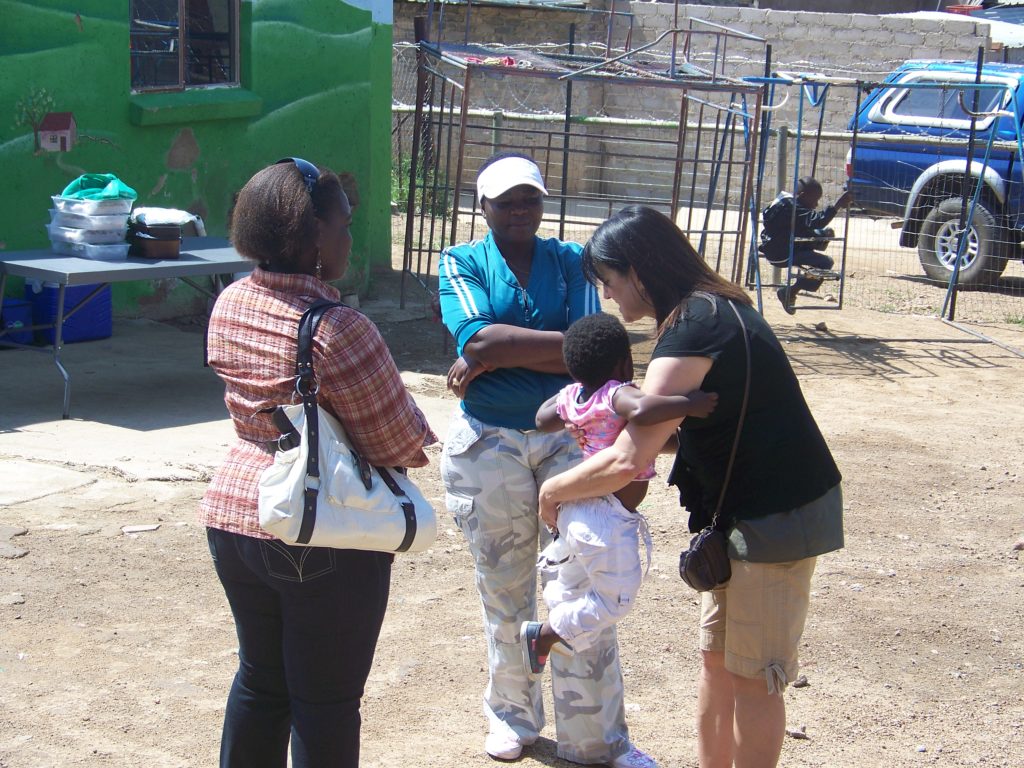
Janet: By now, my kids are teenagers. Mario and I had a girl together. We had moved and joined a nondenominational church that started a relationship with this another group of churches all over the world that had leadership training times in different areas. One of them is Malawi. We decided to go.
It was transforming. It was just like everything that I had believed exploded again, and now all of a sudden, this was a God that was for all this world. It was wonderful. I was part of a team that was really making a difference. We had provided all kinds of stuff. Bicycles and supplies for these pastors in Malawi.
Diane: So, wait. The purpose on your trips was to provide supplies, mostly?
Janet: Sometimes. It depended.
“There was nothing typical about our days in Africa—whether we were in South Africa or Malawi, or Kenya, or Egypt”
Diane: What else did you do? What was your purpose there? What was a typical day like for you?
Janet: Every day began with an African sunrise—every day ended with an African sunset. Other than that, nothing was the same. When we traveled into “the bush” we were usually doing really physical work—digging wells, replacing pumps, building or breaking down structures—for the existing churches who had relationship with our team.
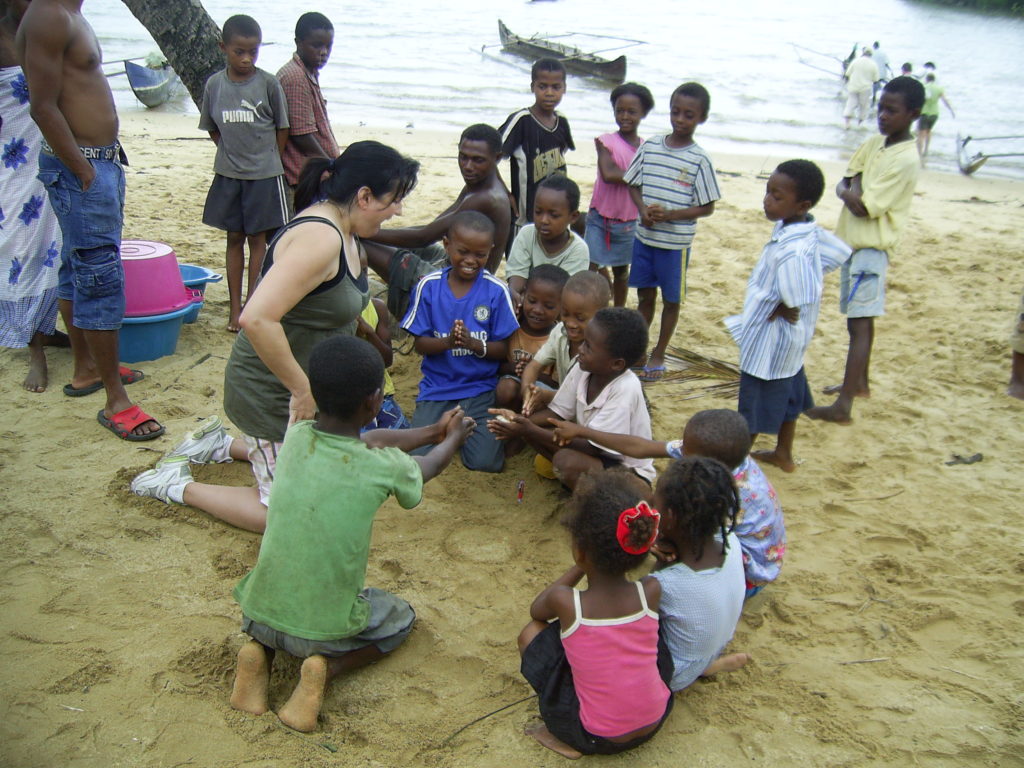
When we were home in Johannesburg, a day might begin with entering in data for a widows and orphans program in the township; it might be a day of driving a friend to see a family member in a community hospital.
Once, when I was cleaning out a storage room at our church, I was interrupted by a frantic call from a mother whose child was kidnapped and released near her home. The child was twelve and couldn’t remember anything. I had to go over, collect both mother and daughter, and take her to a reputable doctor—who guaranteed that no rape had happened, but that the girl had been traumatized, nevertheless. There was nothing typical about our days in Africa—whether we were in South Africa or Malawi, or Kenya, or Egypt.
We decided to be part of this big work. And Diane, when we got settled, I found myself in that performance orientation box all over again: “This is who God is. He likes the good. He doesn’t like the bad. You’re bad. You’re a feminist American woman, who wants what she wants when she wants it.” On the mission fields here, women have to be a certain way, and that’s not how you are naturally.
“But I didn’t fit the mold, and there was a mold”
Diane: So, you never felt comfortable there, in those seven years?
Janet: I definitely did feel, in some ways, comfortable, and I did believe in the work that was being done. And I’ve never, to this day, I’ve never been involved in such a committed, selfless work of God. Because you literally … All of your resources. All of your time, all of your money, everything goes to that work.
But I didn’t fit the mold, and there was a mold. And for a long time, I thought that my purpose was to show them that maybe their mold was wrong.
Then I realized, “No, that’s not my purpose.” I got right back into the same box, and right back into my same habits of killing my emotions with alcohol.
Diane: So, you started believing that you were bad again because you took on their perceptions of you.
Janet: Really. Yes, I did.
Diane: And then you started self-medicating with alcohol.
Janet: Yeah.
Diane: Your kids were home at that point?
Janet: Well, because our kids were teenagers, the team said, “It has to be their decision. You can’t force your children to be part of this work.” Both of the kids liked traveling. They liked going with us on these trips. But they weren’t sure living there was for them.
Our daughter went with us for the first year. Our son came out later and spent a year with us there, and he really liked it. Because he was a man, he fit right in. But it wasn’t for him. Both of them liked it, but it just wasn’t their life.
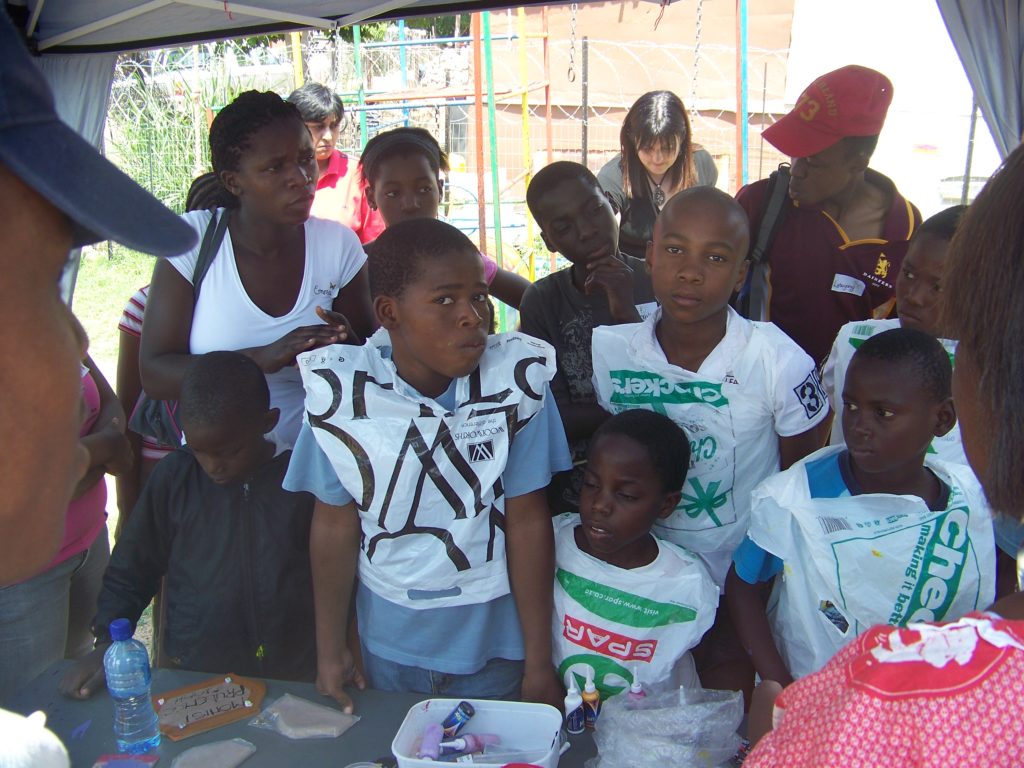
Diane: They were older teens? Where did they live when you left? How did you feel about leaving them? How did they feel about it?
Janet: Looking back, all of our family was very supportive, but because I was so excited about the work we were involved in, I wasn’t paying attention to how much they were grieving. Our kids, especially, grieved our move. I come from a pretty close-knit family, and I home-schooled the kids until they were in middle school/high school, so I think the decision to move to Africa seemed awfully “final.”
“Hindsight, they say, is 20/20, but in truth, hindsight is a movie of your life that you’re forced to watch over and over. You know what happens, but you can’t change a thing”
As I said before, our daughter (and our niece) came out for the first six months to try South Africa. Our daughter ended up coming back for another six months, but then basically said, “This just isn’t for us. It’s alright if you want this, but I don’t.”
Her decision to leave broke my heart, but I think it broke hers just as much. Later, our son spent a year with us, and he really loved it, but in the end, he decided to leave as well. Both of them made adult decisions to come with us, live with us, and take part in the work we were doing, but they also made adult decisions to go back.
Hindsight, they say, is 20/20, but in truth, hindsight is a movie of your life that you’re forced to watch over and over. You know what happens, but you can’t change a thing. I would do a LOT of things differently, but I try not to dwell on my wrong choices. The biggest deal is that I would have spent a lot less time worrying about breaking “the mold” of what I was supposed to be and spent a lot more time taking care of myself and connecting with my family.
“When you’re in the mission field, you deal with everyone else’s drastic changes and upheavals—it’s a privilege to help others. What I didn’t expect was my own drastic changes and upheavals”
Family problems, death and disease are hard enough when you’re all in the U.S.—but when you’re away, things have a way of feeling magnified and unresolved.
By the time we came home, I had a much better perspective of myself and my family. Everyone was happy we were back. We had delayed grieving together, lots of tears and laughter. We recognized serious flaws in our family, but we also were grateful for our unique desire to heal. It would take me (and maybe everyone else) a few years to believe that we were staying put for good. We spent time with every child and their families to debrief. They all forgave what they needed to forgive, and we are all, to this day, close. I’m always surprised that our kids are so forgiving; I value and treasure this character quality in them.
Diane: That’s wonderful. I’d like to switch gears a bit. I’m really interested in the issue of invisibility, of not being seen for who you are. I think that’s one of the root problems in our world right now.
Janet: Yeah, yeah.
Diane: In your piece for Lunch Ticket, you wrote that Mario said it was a shame the team leader couldn’t see that you were great. But you didn’t either, at that point. Right?
Janet: No.
Diane: So, you were so willing to take on their perceptions of you. And listen, if you’re the only one … You and one other person are the only ones who think you’re great, if you’re in a system that devalues what and who you are, it’s hard to hold on to that. What made you guys decide, “It’s time to go”?
“Now we can look back and say that even the disasters happen for a reason”
Janet: There was a miscommunication that turned out to be an explosion. One afternoon—and I can’t tell you exactly what was said, because I wasn’t there—but one of the leaders asked to meet with Mario over coffee, and the leader ended up saying some things he shouldn’t have said. I think it came across to my husband like this: “Your wife is offensive because she’s not happy. Everyone knows she’s not happy here in South Africa, and maybe it’s time for you to take her home.” There were some things said in relation to how we did our jobs there, too.
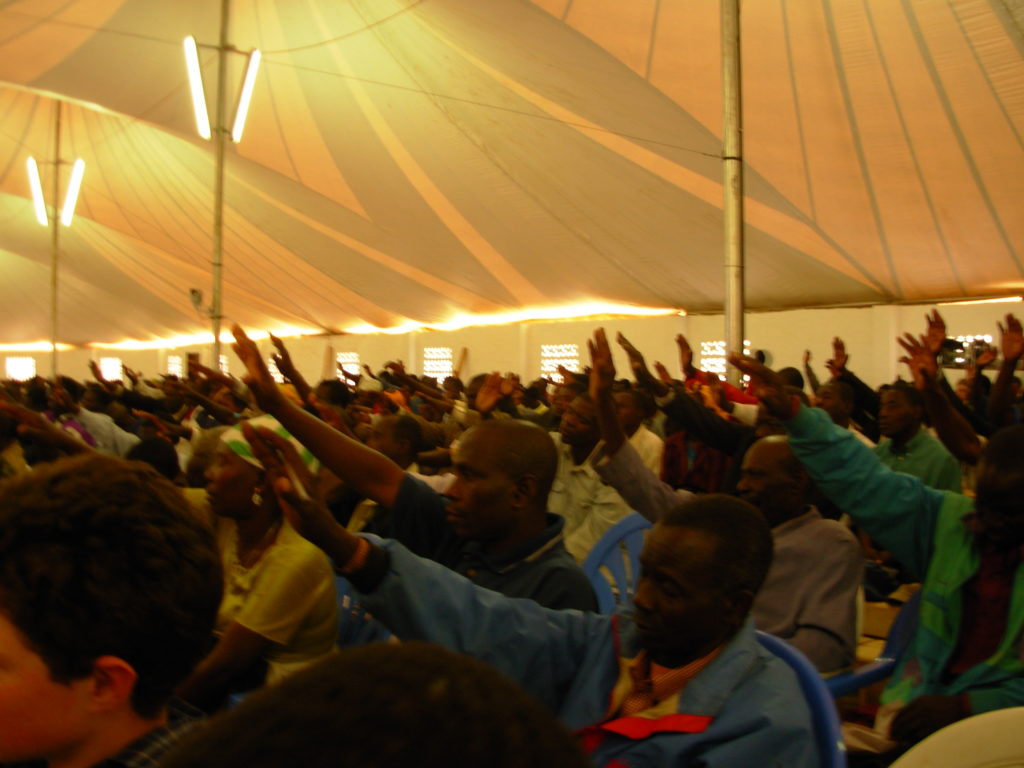
Like I said, it was all a miscommunication, but when there’s that kind of conversation, you can’t just say, “Whoops! Maybe I shouldn’t have said all that. I should have thought it through better!”
There was an apology, an olive branch, they tried to smooth things over… but in the end, Mario wrote a letter of resignation and we made plans to leave. Even the people we worked closely with didn’t know all of this happened … they thought we were leaving because we missed family, which we did. But we would have left after two years if that were the reason.
Coming home for Mario was very different from coming home for me. I was READY to come home. But Mario was discouraged with how it all ended. He was convinced we heard God when we moved there; he thought it would be the same when we left.
In a way it was like, “Oh, I guess I’m fired.” It took him, I’d say three years, to really feel normal again—to understand that God redeems everything. After that disastrous blow-up there was an opportunity—when we went back, one year later—to meet with that leader again. There was a discussion of how things were, and we opened our ears and hearts again to each other—there was real forgiveness on every side. Now we can look back and say that even the disasters happen for a reason.
So, we’ve both had issues of identity, and I guess invisibility.
“You donate 95% of your stuff. What do you keep? I kept all my journals and books. It was then that it was exposed, ‘This is who I am.’”
Diane: How soon after you got home did you go back to school?
Janet: Oh. A year. A year after we got back to the States, I decided to go back to college.
Diane: How old were you when you
went back to college?
Janet: 51.
Diane: 51. Here we go!
Janet: Yes.
Diane: What made you decide that you were a writer?
Janet: Well, I’ve always written. That’s the whole thing … When we left for Africa, we gave away 95% of our stuff.
Diane: Wow.
Janet: So, you donate 95% of your stuff. What do you keep? I kept all my journals and books. It was then that it was exposed, “This is who I am.”
Diane: Wow.
Janet: If I could give away everything, but keep one thing, I will never give away my writing, and I will never give away the books that have changed me.
Diane: That’s very powerful.
Janet: It’s powerful. I had a friend
whose apartment building burned down, and they evacuated her. She took a
laundry basket and went and got her journals. Put them in a laundry basket and
ran down the stairs. And I said, “When everything else burns away, who are
we?”
I went back to school and graduated with a degree in
English.
Diane: And then you applied to Antioch.
“I have neglected this side of me, this Latina side. I need to know how many Latina writers are here, part of your program.”
Janet: I read Bernadette Murphy’s Harley and Me. She kind of had the same type of transformation of spirit that I did. Which is, she had to realize that at any age, she could start anything.
So, I wrote her kind of a fan letter. “Thank you so much for writing this book, I wanted to start an MFA program, but because I don’t have an undergraduate degree, I went back to school and I’m getting that now … blah, blah, blah.” And she wrote back and told me I could come to Antioch without an undergraduate degree. In fact, she called me, and we talked about it.
Diane: Oh, wow.
Janet: She said, “Janet, come over. You can start right now.” I had maybe three months left before I graduated with a bachelors, so I decided to finish my degree and I started the program the following June, when I met you.
Diane: I would like to hear a little bit about your new project, about tracing your family roots, and how has working on that, and being in the MFA, changed you?
Janet: Before I came to the program, I remember talking to Steve. (Steve Heller was the program director at the time.) I brought my mother with me to the interview. I said, “I have neglected this side of me, this Latina side. I need to know how many Latina writers are here, part of your program.”
And he looked at his board … He’s got this whiteboard in his office of mentors.
And he said, “Right now, we only have one.” And I said, “Is it Alma? Is it Alma Luz Villanueva?” And he said, “Yes, it’s her.” So, I said, “Okay. That’s good enough for me.” Basically, I just said, “I’m in.”
“I think the most challenging is taking these voices and piecing together their story in truth”
This last project period, I did a book of short stories with Alma. It’s a fictionalized book of short stories based on my growing up in Tracy, and being raised Catholic, and …
And then this semester, I’m doing a creative nonfiction on my mother’s family, the Gonzalez’s, who came over during the Mexican Revolution.
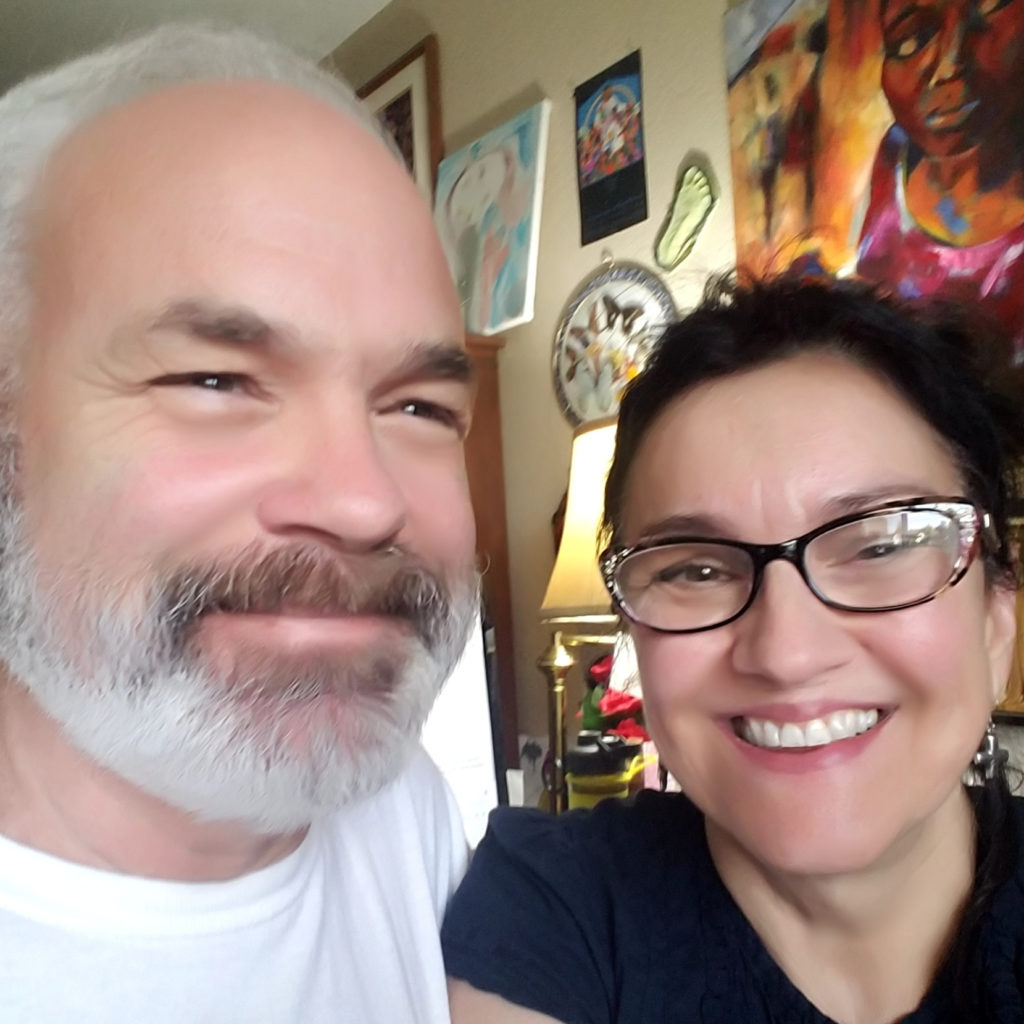
Diane: What has been the most challenging part?
Janet: I think the most challenging is taking these voices and piecing together their story in truth. You know when there are different perspectives, you get a better story? You get a whole story?
Diane: Yes. Yes, yes.
Janet: That’s what this is. It’s all the Gonzalez girls talking about what it was like to grow up, first of all poor, second of all Mexican in a very white California. Assimilating to what America needed from them. It’s easier to blend in than to stand out, and most of them did that. There are a few who didn’t, and the few that didn’t were kind of seen as troublemakers. And I relate to those women. I really do. I relate to those women.
Diane: Working on the Gonzalez women’s story must be healing! I look forward to reading! Thank you so much for doing this, Janet, for being so open, so honest, and for being a true model of resilience.
If you’d like to read some of Janet’s work, here are a few of her reent publications: https://cloudwomensquarterly.tumblr.com/post/181302898220/grinding-rock-by-janet-rodriguez
And https://therumpus.net/2019/04/the-rumpus-interview-with-dorianne-laux/
As always, I’d love to hear from you! Please post a comment or send me an email.
And have a wonderful week!
See you next Friday!
Diane
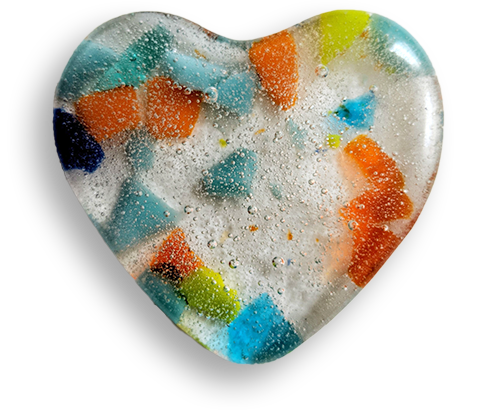


What a beautiful conversation! I’m so grateful to witness Janet’s path and wisdom, and so glad to have crossed paths with you two strong and powerful Antiochians.
Thank you, Rebecca! Same here!!
Hello everyone! I cannot THANK YOU enough for reading and commenting here! Each comment is so beautiful and wonderful for my soul! I am so grateful to have had a chance to share my story but l had never seen all of this in black and white…I hadn’t even typed it up myself, so it was a bit shocking to see it written down. Many women have shared similar stories with me and were grateful that I didn’t judge them–grateful that I could relate. Systematic trauma isn’t as uncommon as we think, and places like this make it safe for us to support one another!! xoxo
Janet, your courage and beauty shine though – thank you for being so honest and sharing your story!
Diane, thank you for helping celebrate awesome women over 50! Great interview!
Thank you, Sherry. Janet’s courage and beauty most certainly shine through!
Beautiful interview, Diane! Janet, thank you so much for sharing your story with us. You discussed deeply personal traumas that, sadly, impact many women. These experiences cause a great deal of shame, isolation, and loneliness, and the only way to end the shame is bring these experiences to light! Your story is empowering because not only have you been able to process and overcome those traumas, but you are also brave enough to speak about them. This interview reminds me of one of my favorite Brene Brown quotes: “You either walk inside your story and own it or you stand outside your story and hustle for your worthiness.” I was moved to read your piece “The Language of Community” and loved your story of the Shangaan women and the blessing of sisterly acceptance. Thank you for helping to spread acceptance and love in that piece and in this interview.
Thanks, Melissa. So well said: “the only way to end the shame is bring these experiences to light.”
Oh, Diane! I love you! Thank you for this interview. I am a little nervous seeing it all here, but this is truthfully who I am. Warts and all, I am me! xoxo Janet
Oh Janet! I love you! And thank you for doing the interview! I can see you might be a little nervous seeing it on the page, but by sharing your story of trauma, you’ve let other women they are not alone and have nothing to hide. By sharing your story of recovery, how you’ve used your experiences to grow and make a difference in the world, you inspire each of us to do better for ourselves, our families, our world. Thank you, again, for your truth! And it’s a truth with a “capital ‘T’!
XOXO
Wow! Thank you for sharing your story, Janet! It’s not easy to talk about trauma. Janet is a very courageous and strong woman. Love it! What an inspiration! Such a powerful interview.
Thanks, Kate. It certainly took a lot courage to share this powerful story of trauma and recovery. Janet is an inspiration for all of us!